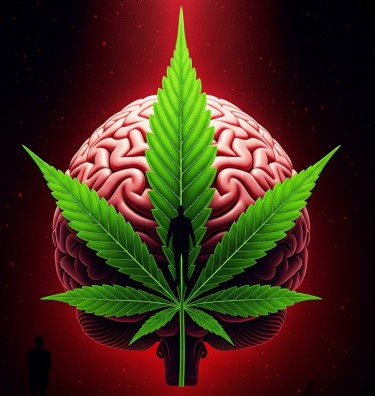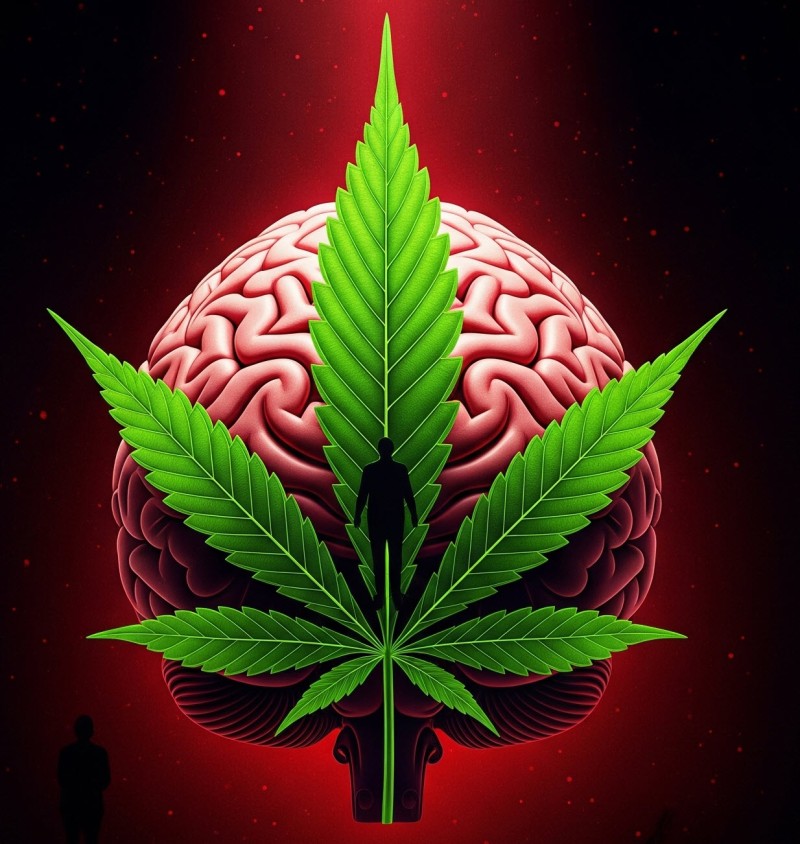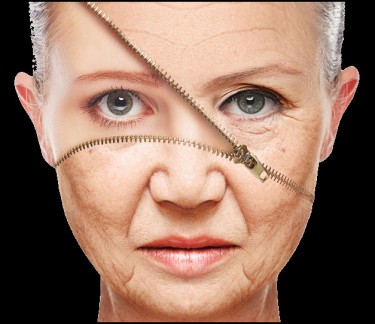
If you've been scrolling through the news lately, you might have seen some alarming headlines suggesting that cannabis use leads to dementia. "Cannabis Users At Higher Risk of Dementia," they screamed, likely causing more than a few of us to pause mid-puff and wonder if we're unwittingly destroying our brain cells.
But as with most sensationalist headlines about cannabis, the reality is far more nuanced than the fear-mongering suggests. The study in question, published in the respected journal JAMA Neurology, deserves a closer look—not just at what it found, but what it didn't find, and perhaps more importantly, what it wasn't even designed to find in the first place.
Let's cut through the smoke and explore what this study actually tells us, what it doesn't, and why nuance matters when discussing cannabis and health.
What the Study Actually Found (and Didn't Find)
The research, which analyzed hospital records in Ontario, Canada, found that people who were hospitalized for cannabis-related issues had a higher rate of dementia diagnosis within five years compared to both the general population and people hospitalized for other reasons.
Specifically, about 5% of those with cannabis-related hospitalizations received a dementia diagnosis within five years, compared to 3.6% of those hospitalized for other reasons and 1.3% of the general population. After adjusting for factors like age, sex, and certain health conditions, the cannabis group still showed a 23% higher risk than other hospital patients and a 72% higher risk than the general population.
Sounds scary, right? But before you flush your stash, consider what one of the study's own authors, Dr. Daniel Myran, told CNN: "This is not a study that anyone should look at and say, 'Jury's in, and cannabis use causes dementia.'"
That's right—the researchers themselves are emphasizing that their study does not establish causation. They found a correlation, an association, but not causation. And in the world of science, that distinction is crucial.
The Critical Context Missing From Headlines
As a biostatistics graduate student on Reddit aptly pointed out, this study focused exclusively on a tiny subset of cannabis users—those who ended up in the hospital due to acute cannabis-related issues. We're talking about 16,275 people out of a population of over 6 million. That's roughly 0.27% of the population.
These aren't your average weekend tokers or medical cannabis patients managing pain or anxiety. These are individuals who experienced such severe adverse reactions that they required emergency medical attention. This crucial context was largely absent from mainstream reporting.
Moreover, the study has several important limitations:
-
It doesn't capture how much cannabis these individuals used, how frequently they used it, or what methods of consumption they preferred.
-
The data comes from health records, which don't include many potential confounding factors like mental illness history, social isolation, education level, or tobacco use—all of which can influence dementia risk.
-
Perhaps most importantly, there's the possibility of reverse causality. Early, undiagnosed dementia can cause confusion, poor judgment, and risky behavior—which could potentially lead to cannabis overconsumption requiring hospitalization. In other words, the early stages of dementia might have contributed to the hospitalization, not the other way around.
This last point is particularly significant. Dementia doesn't suddenly appear one day; it develops gradually over years, with subtle cognitive changes often preceding formal diagnosis by a substantial period. It's entirely possible that some individuals in the study were already experiencing the early effects of dementia when they were hospitalized for cannabis-related issues.
The Neuroprotective Potential of Cannabis
What's especially frustrating about the alarmist reporting is that it completely ignores a substantial body of research suggesting that certain cannabis compounds may actually have neuroprotective properties. Multiple studies have investigated the potential of cannabinoids, particularly CBD, to protect brain cells and potentially slow neurodegenerative processes.
In fact, medical marijuana is currently prescribed to many people with Alzheimer's disease across the country to help manage symptoms like agitation, anxiety, and sleep disturbances. Some research has even suggested that low doses of THC might help reduce the buildup of amyloid plaques, a hallmark of Alzheimer's disease.
None of this contradicts the Canadian study's findings—it simply demonstrates that the relationship between cannabis and brain health is far more complex than "cannabis = brain damage," as some headlines would have you believe.
Know Your Risk Factors
While the study doesn't prove cannabis causes dementia, it would be irresponsible to suggest cannabis carries zero risks. The truth lies somewhere in between these extremes, and certain individuals may indeed be more vulnerable to potential negative effects.
People with a family history of certain mental health conditions, particularly psychotic disorders like schizophrenia, should approach cannabis with caution. Research has consistently shown that cannabis use can potentially trigger or exacerbate psychotic symptoms in predisposed individuals, particularly with high-THC products.
Similarly, people with existing cardiovascular issues should be aware that cannabis can temporarily increase heart rate and blood pressure, which could potentially exacerbate their condition. And those with a personal or family history of addiction may be more susceptible to developing problematic cannabis use patterns.
Age also appears to be a significant factor. Most research suggests that adolescents and young adults whose brains are still developing (up to roughly age 25) face higher risks from regular cannabis use than older adults.
That said, the vast majority of cannabis users—particularly those who consume moderately and are aware of their own risk factors—never experience serious adverse effects. The risk of ending up hospitalized due to cannabis, as the subjects in this study were, is exceptionally low.
Media Malpractice and Fear-Mongering
The way this study was reported represents a familiar pattern in cannabis coverage—take a limited, correlation-based study with significant caveats, strip away all nuance, and transform it into a scary headline designed to generate clicks rather than inform the public.
This approach does a disservice not only to the researchers whose work is being misrepresented but also to the public who deserve accurate, contextual health information to make informed decisions. It's particularly harmful to medical cannabis patients who may unnecessarily fear that their medicine is causing brain damage.
Interestingly, we rarely see similar alarmism around studies of alcohol, despite the overwhelming evidence of its neurotoxic effects. A 2018 study published in The Lancet concluded that there is no safe level of alcohol consumption for brain health, yet this didn't generate nearly the same level of panicked headlines.
The discrepancy highlights the ongoing stigma around cannabis and the media's tendency to amplify potential risks while downplaying potential benefits—a lingering effect of decades of prohibition propaganda.
How to Be a Smart Cannabis Consumer
Despite the misleading headlines, this study does offer an opportunity to reflect on responsible cannabis use. Here are some evidence-based guidelines for minimizing potential risks:
-
Know your family history: If you have a family history of psychotic disorders, early-onset dementia, or other significant mental health conditions, be particularly cautious with cannabis, especially high-THC products.
-
Start low, go slow: Particularly with edibles and concentrates, begin with a low dose and wait to see how it affects you before consuming more.
-
Be aware of your mental state: If you notice cannabis consistently worsens anxiety, paranoia, or other negative mental states, it may not be the right choice for you.
-
Consider CBD-dominant products: For those concerned about potential cognitive effects, products with higher CBD-to-THC ratios may offer benefits with reduced risk of adverse effects.
-
Stay informed: Follow reputable sources that provide nuanced, evidence-based information about cannabis and health, rather than sensationalist headlines.
-
Take breaks: Regular tolerance breaks can help prevent dependence and give you perspective on how cannabis affects your cognition and well-being.
The Sticky Bottom Line
The relationship between cannabis and brain health is complex and still being unraveled by researchers. This latest study adds a piece to that puzzle, suggesting that among a very specific population—those hospitalized for acute cannabis reactions—there may be a higher likelihood of subsequent dementia diagnosis.
But this finding, while worth noting, doesn't support the conclusion that the average cannabis user is damaging their brain or increasing their dementia risk. The study's design, limitations, and the researchers' own statements make this clear.
What's truly concerning is not the study itself, but how eagerly certain media outlets transform limited, correlational research into definitive, causative clickbait. This pattern of fear-mongering doesn't serve public health; it merely perpetuates stigma and misinformation.
Cannabis, like any psychoactive substance, carries some risks for some people. It's not a perfectly harmless miracle plant, despite what some enthusiasts might claim. But neither is it the brain-destroying boogeyman portrayed in sensationalist headlines.
The truth, as usual, lies in the nuance. And when it comes to something as important as brain health, nuance matters.
So the next time you see a headline claiming cannabis "causes" some terrible outcome, take a deep breath, read past the headline, and look for what the research actually found—not what someone wants you to believe it found. Your brain deserves that much respect, at least.






